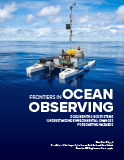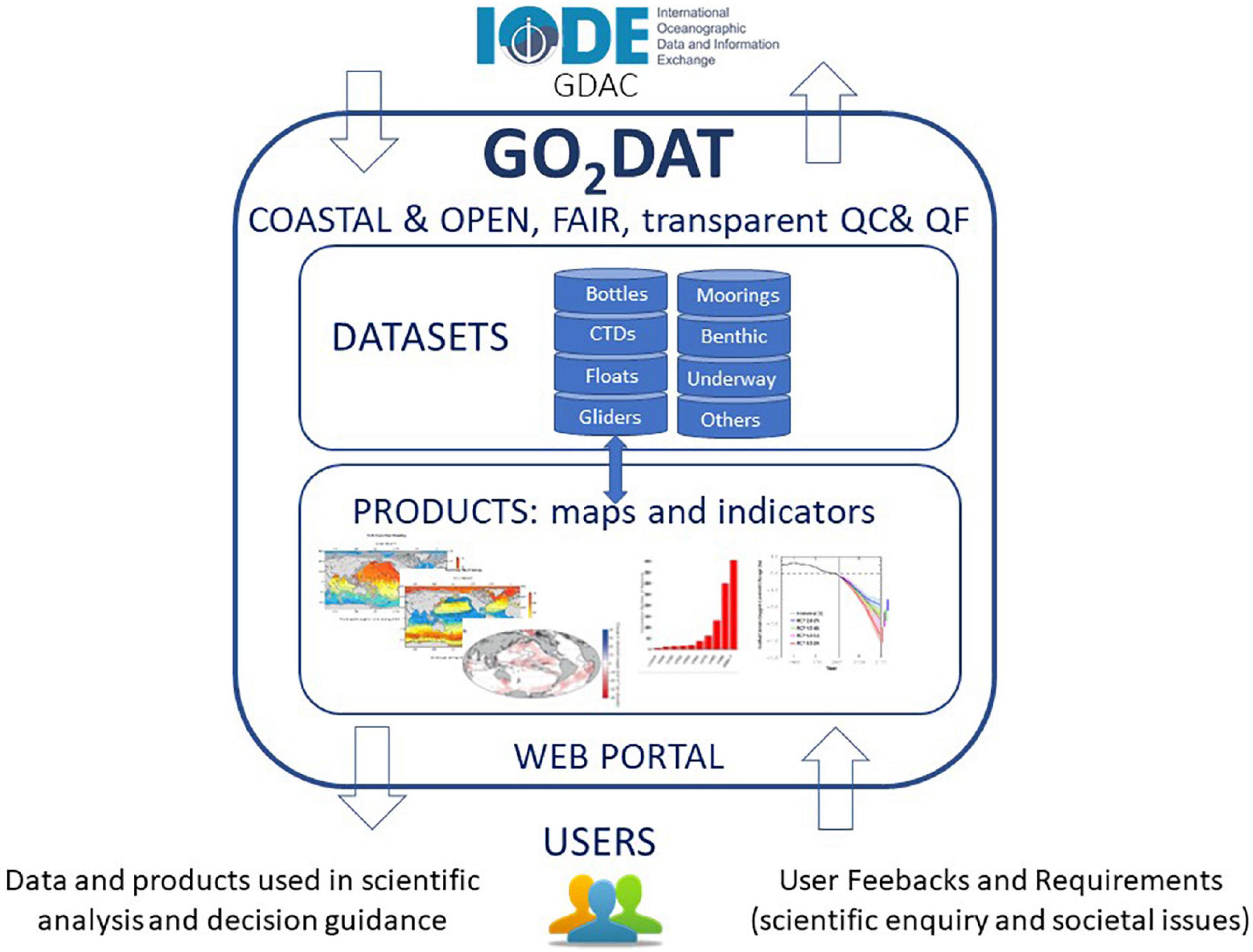News
+ more news
Ocean Integration: The Needs and Challenges of Effective Coordination Within the Ocean Observing System
Friday, 11 February 2022
We would like to bring to your attention a very refreshing overview of the current status, challenges and paths forward related to ocean observing system integration and coordination, published in Frontiers in Marine Science in late January: https://www.frontiersin.org/articles/10.3389/fmars.2021.737671/full.
Adèle Révelard and co-authors describe the current, rather suboptimal, situation touching on many fundamental drawbacks like excessive multiplication of overlapping efforts, confusion related to roles and responsibilities of entities involved in coordination, counter-productive effects of current academic excellence assessment system and more. They then point to several critical transformations needed in order for the ocean observing system to evolve into a societally useful, structurally flexible and innovative tool aligned with the spirit of the UN Ocean Decade.
We praise the authors for referring to and concluding from a large body of work on the topic published in the past decade or so, and recommend reading this article to everyone with stakes in ocean observing integration and coordination.

Update on the 53rd Ocean Liège colloquium-GO2NE oxygen conference
Tuesday, 08 February 2022
We would like to give you an update on the 53rd Ocean Liège Colloquium-GO2NE Oxygen Conference which will take place from May 16th to May 20th 2022 (with a mentoring event for early career scientists on May 15th). Considering the circumstances, the event will be in a HYBRID FORMAT to be able to engage with all of you throughout the world. You will have the possibility to present your work either on site or at distance.
The abstract submission deadline has been extended until February 20th. At this stage, we have already received more than 130 abstracts. More information on the event's web site: https://www.ocean-colloquium.uliege.be/
Seawater DI14C comparison exercise - request to fill out a survey for interested participants by 11 February
Thursday, 03 February 2022
We would like to let you know about a new effort to organize an international seawater DI14C comparison exercise the immediate need for which was recognized by the participants at the recent Carbon Isotope in the Ocean workshop, sponsored by US Ocean Carbon & Biogeochemistry. If this of interest to you or your group, please fill out a short form (https://forms.gle/L9YrmtahxXBBCivE9) in order to help the organizers find out how many laboratories would like to be involved in such an exercise.
Please fill out this form by February 11, 2022. Thank you!
On behalf of: Ann McNichol (WHOI, USA), Bob Key (Princeton University, USA), Roberta Hansman (WHOI/NOSAMS, USA), Rolf Sonnerup (University of Washington, USA)

The 2022 Call for SCOR Working Groups is open!
Friday, 21 January 2022
The Scientific Committee on Oceanic Research (SCOR) Secretariat invites proposals for new working groups to commence activities in late 2022. Deadline for submissions is 30 April 2022. The selection of the new SCOR working groups will take place at the 2022 SCOR Annual Meeting scheduled to take place in Busan, Korea, on the week of the 3-7 October 2022.
You can find instructions, guidelines and a template to help prepare the proposals by following the link here. For more information, read the full call here.

10th GO2NE Webinar on Ocean Deoxygenation, 26 January, 15:00 UTC
Thursday, 20 January 2022
Please join the Global Ocean Oxygen Network (IOC Expert Working Group GO2NE) for a new session of its webinar series on ocean deoxygenation. This 10th webinar will take place on 26 January 2022 at 15:00-16:00 UTC. The webinar will feature presentations by: Niels van Helmond (Utrecht University, the Netherlands) on "Sedimentary trace metals: a powerful indicator for bottom water redox conditions," and Laura Bristow (University of Southern Denmark, Denmark) on "Nitrogen cycling in anoxic waters: oxygen contamination and the need for in situ measurements." You can register for the webinar HERE. Recordings from this and past webinars are available from here: https://www.youtube.com/results?search_query=unesco+go2ne

"Frontiers in Ocean Observing" supplement published in Oceanography
Tuesday, 11 January 2022
We would like to let you know that Oceanography, the official magazine of The Oceanography Society, published its inaugural supplement on ocean observing, entitled "Frontiers in Ocean Observing: Documenting Ecosystems, Understanding Environmental Changes, Forecasting Hazards." Articles in this collection describe new technologies and reveal some exciting results that advance our understanding of the world ocean and its resources and support its sustainable use and management. Topics covered in the supplement align with the priorities of the UN Decade of Ocean Science for Sustainable Development (2021–2030) in the following areas: (1) Ocean-Climate Nexus, (2) Ecosystems and Their Diversity, (3) Ocean Resources and the Economy Under Changing Environmental Conditions, (4) Pollutants and Contaminants and Their Potential Impacts on Human Health and Ecosystems, and (5) Multi-Hazard Warning Systems. The sixth and closing chapter describes several exciting new ocean observing technologies.
The supplement contains several articles related to marine biogeochemistry observations, including contributions from IOCCP SSG and Office members. You can access the whole collection here: https://tos.org/oceanography/issue/volume-34-issue-04-supplement

Roadmap for an open-access Global Ocean Oxygen Database and ATlas (GO2DAT) published
Wednesday, 22 December 2021
We are delighted to let you know that an important paper describing a roadmap for an open-access Global Ocean Oxygen Database and ATlas (GO2DAT) has been published in Frontiers in Marine Science (https://www.frontiersin.org/articles/10.3389/fmars.2021.724913/full).
Eight current and recent IOCCP SSG members contributed to the work carried by 57 scientists from 45 institutions in 22 countries aimed at fully harnessing the increasing volumes of oxygen data already delivered and in anticipation of much higher quantities of data from autonomous platforms in the open ocean and coastal areas.
In coming months and years, IOCCP’s engagement around the Oxygen EOV will, to large extent, focus on implementing the roadmap laid out in this paper. GO2DAT is hoped to combine oxygen data from the coastal and open ocean measured by a variety of methods on a myriad of operating platforms. Community-agreed, fully documented and consistent quality control (QC) procedure and quality flagging (QF) system will be adopted to support the development of advanced biogeochemical models and data synthesis products, significantly improving our mapping, understanding and forecasting capabilities.

Reminder: Abstracts due and travel grants available for the 53rd International Liège Colloquium on Ocean Dynamics,16-20 May 2022, Liège, Belgium
Monday, 20 December 2021
We would like to remind you that the abstract submission deadline for the 53rd International Colloquium on Ocean Dynamics is on 16 January 2022. A limited number of travel grants are offered to young scientists, PhD students and early post-docs who are submitting an abstract as presenting author (oral or poster). To apply for these grants, please send your application before January 31st 2022. Follow this link for more information on the travel grants and application process.
The Colloquium, co-sponsored and co-organized by IOCCP, will take place on 16-20 May 2022 in Liege, Belgium, and is a contribution to the Ocean Decade program Global Ocean Oxygen Decade (GOOD). Please see the Colloquium website for a complete list of sessions and other information. Feel free to use the attached flyer to spread the announcement among your colleagues.

Call to contribute to the first global coastal water dissolved organic matter database
Wednesday, 15 December 2021
Dissolved organic carbon (DOC), nitrogen (DON) and phosphorus (DOP) are important pieces of the biogeochemical cycles in coastal waters, with DOC constituting one of the Essential Ocean Variables. Many of us have Dissolved Organic Matter (DOM) measurements sitting around in spreadsheets, some published and some unpublished, which may eventually be lost or misplaced. This data properly compiled and freely available would be a valuable resource for the global research community. We have already collected a considerable dataset of DOM values (~5k measurements) but would like to develop this with the DOM research community into a comprehensive global database of observations.
The objectives of the database are to: 1) gather DOM coastal data to have a baseline for future studies (e.g. looking at global environmental change), 2) publish an updated version of the database periodically (e.g. every 5 years) to determine global trends of DOM levels in coastal waters. With this in mind a first data paper describing the database will be submitted to the journal Earth System Science Data, and all data contributors will be co-authors on this manuscript. Therefore, if you have any coastal water DOC and/or DON and/or DOP measurements from estuaries (salinity > 0.1) to the shelf (water depth < 200 m), however old, few or many, we would like to include them in the database. Please also note that we would like to receive the data by the latest on the 15th of April 2022.

Reminder: Call for 2022 SCOR Visiting Scholars - deadline 15 December 2021
Friday, 10 December 2021
For those of you interested in submitting an application for the 2022 SCOR Visiting Scholar program, please note that the deadline is next week, 15 December 2021. For more than a decade, SCOR has supported Ph.D. level ocean scientists from developed and developing countries to teach short courses and provide extended on-site education and mentor-ship at developing country institutions.
More information about the call and the application form can be found here. Applications should be sent to Patricia Miloslavich to: This email address is being protected from spambots. You need JavaScript enabled to view it.
The IOCCP promotes the development of a global network of ocean carbon observations for research through technical coordination and communication services, international agreements on standards and methods, and advocacy and links to the global observing systems. The IOCCP is co-sponsored by the Scientific Committee on Oceanic Research and the Intergovernmental Oceanographic Commission of UNESCO. Read more…
Calendar
|
|
IOCCP meetings, IOCCP-related meetings as well as events related to a wider scope in marine biogeochemistry. |





 Please wait...
Please wait...